
We were out at Holyfield again. Last year was pleasant enough at Pony Express and very close to home for me, but Les and Michelle have a special place in my heart, and a great venue for this event. For the uninitiated, Holyfield is an anomaly among midwestern wineries: they make some awfully good wine. They don't fight the climate, they just grow hybrids that work around here, and the results are awesome. They have, in fact, a substantial wall of ribbons and medals from competitions where they were up against California and Australia and whatnot. You don't get a double-gold in the Pacific Rim competition without putting something worthwhile in the bottle.
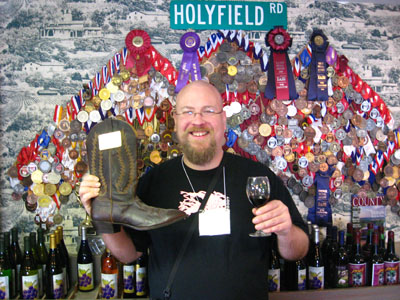
The Beer Judge Certification Program awards experience points for judging, and coupled with your score on a BJCP exam, those points translate to a ranking. I've been a National rank judge for a few years. The next rank up is Master, which would require I forget how many experience points, plus I'd have to re-take the test and do better than I did last time around.
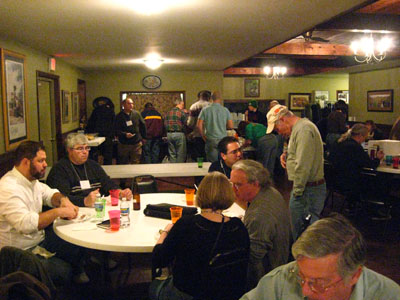
Which would mean a lot of study. For one, the style guidelines have been massively overhauled twice since I took the test, sometime in the late '90s. Luckily, the competition organizers provide binders with the guidelines that are in effect for the competition, so we beer nerds have a reference to guide our scoring and to settle the inevitable beer-geek arguments about whether a Munich malt character is necessary in a Schwarzbier or if a hop aroma is or isn't acceptable in an Imperial Stout. The latter example, used to be a 'no,' but the current guidelines allow for a dry-hopped Imperial.
I know, I've lost you non-beer-geek folk already. For a bit of context: tell someone you're judging beer and they'll say stuff like 'I judged three of them last night. Know what score I gave 'em?' I'm waiting for someone to be more clever: 'I had to hold a beer in contempt of court the other day. Sent it to the cooler for a bit.'
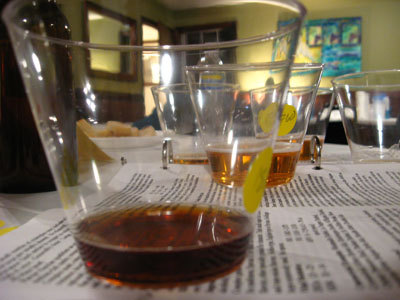
Hop aroma in an Imperial Stout is, according to the guidelines I tested under, inappropriate to the style. I happen to agree with that, hop-head that I am, but the current guidelines allow it, so if I was judging an Imperial Stout, I couldn't dock it for having a character I personally think shouldn't be there. This is what makes beer judging not quite total bullshit: it's not about what you like, it's about whether what's in the glass is what's supposed to be based on the category it was entered in and how the BJCP is defining that style these days.
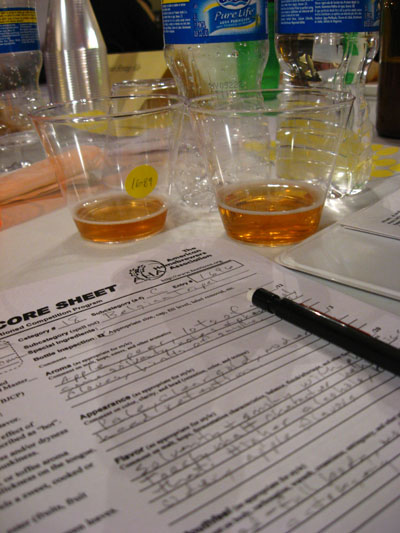
The second thing that would surprise the average Joe: it's a surprisingly objective process. Taste is subjective, but specific tastes not so much. You might like bitterness or hate it, but the answer to the question 'is it bitter?' is closer to objective.
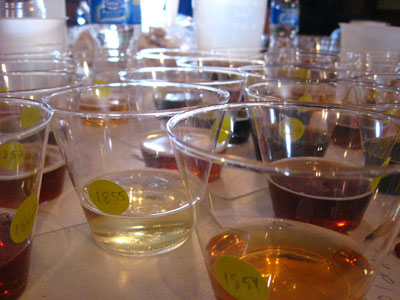
When judging, the samples are poured, typically about 2 oz. in each judge's glass and usually the same for the steward. Stewards are not always aspiring judges, but they often are. Tasting along with the judges and listening in and participating in the discussion is a good education.
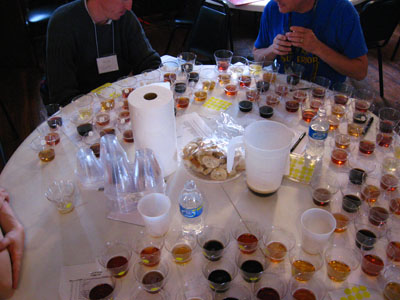
Each judge, two to three per flight typically, evaluates the beer's aroma, appearance, flavor, mouthfeel and overall impression, relative to the style it was entered in, independently. It's a 50 point scale, and it's weighted: appearance is only worth 3 points, so if a beer fits a style perfectly except it looks wrong, it'll do fairly well. A beer that misses major flavor or aroma aspects is not going to do as well, even if it's something the judge likes in terms of what he'd be glad to drink.
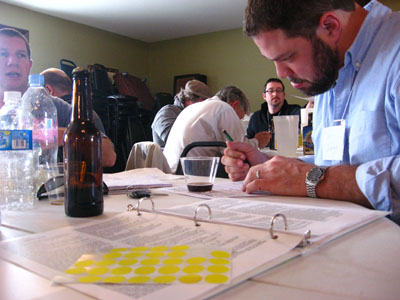
One of the clichés in the overall impression is 'I liked this but...'
Very often, the three judges are within a point of each other after that initial evaluation. The maximum spread allowable is 5 points, which means that when one judge is missing something or doesn't understand the style he's judging, there's a check there. A discussion of why a beer is or isn't worthy of a score, informed by the style guidelines, gets us within the five point margin. This buffers the scoring from personal preferences, palate fatigue (judge a flight of American IPAs and even a club soda would taste like Cascade hops), and lack of attention to the guidelines.
The game is also about constructive criticism. Even when you get a beer so bad you can tell it's fucked up from a table away...
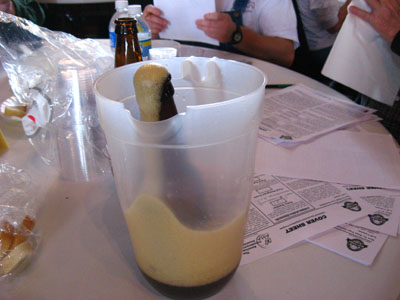
The third shocker for the uninitiated is judging beer is not drinking beer. I mentioned this 2 oz. sample, but it doesn't get consumed. A bit does, but you're evaluating, not knocking a few back.
The first time I judged, it was meads at AHA first rounds. I was signed up to steward but they were short judges and I found myself novice judge along side Jackie Rager and the Late Great Steve Ford. The first mead we judged was very good, and after we had all rated it and discussed it, I decided it was too good to waste and consumed the rest of the sample.
'We are not here to consume,' Jackie told me. 'You go and drink all these entries and you won't know what the hell you're tasting.'
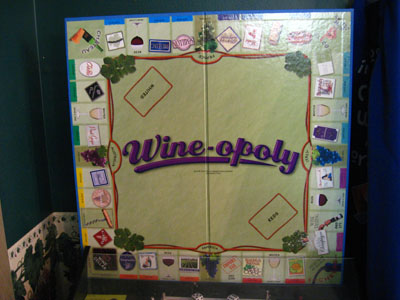
And he was right. Beer judges don't aspirate like wine judges, the rationale being that aftertaste is a component of a beer's quality (and we judge fewer entries per flight by about a third and they're lower in alcohol in any case), but a half an ounce to an ounce is usually plenty for a thorough evaluation. Alcohol, though, dulls perceptions, and if you're judging, say, 14 entries, drinking the full sample will impair.
In fact, judging beer is something that works the the thirst for a beer like nothing else. Judging is the strip-tease that makes a beer lover glad to get back in the arms of his lover, even if some of the strippers turn out to be skanky.
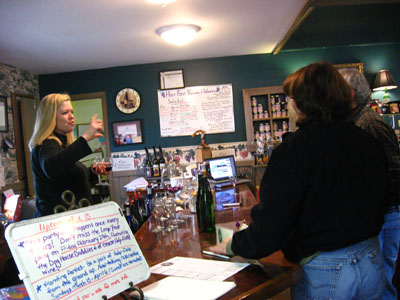
I did get to judge Best of Show, which is always a treat. Well, a treat and a torture. You're evaluating 28 entries that each took first place in their respective categories. A lot of them are easy to kick at this point, but the argument that 1791 is a better Foreign Extra Stout than 1881 is a Munich Dunkel can drag on a bit. How many hop-heads can dance on the head of an IPA?

No comments:
Post a Comment